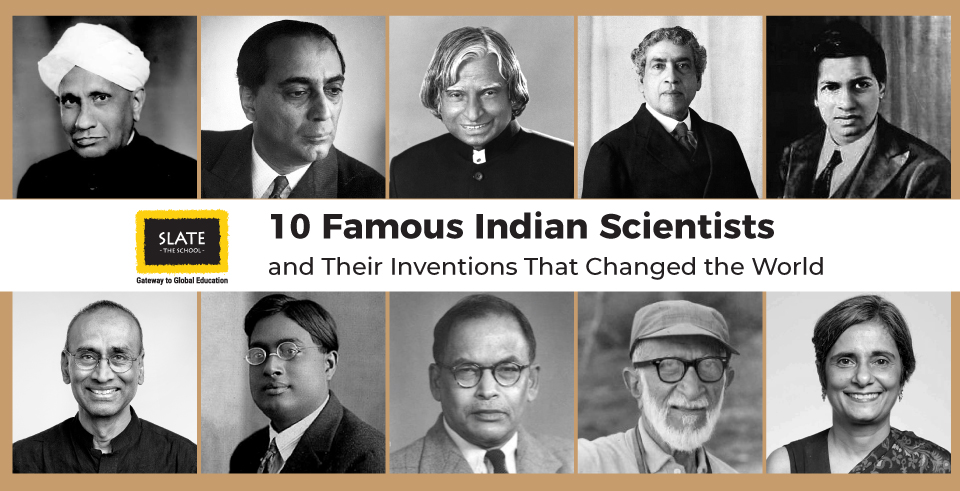India boasts a vibrant and motivating history of science and innovation that goes back decades. From ancient thinkers who made mathematical and astronomical concepts a reality to present-day scientists hogging the spotlight in nuclear science, space travel, and medicine Indian brains have always played a role in shaping the world. This article is a tribute to ten of the most renowned Indian scientists whose achievements went beyond boundaries and time, not just affecting India but the entire scientific community worldwide.
- C.V. Raman – Revealing Light’s Secrets
Sir Chandrasekhara Venkata Raman, or C.V. Raman for short, who first found the Raman Effect in 1928, totally changed the face of physics. The ground for modern spectroscopy was laid by this phenomenon, which accounts for the scattering of light while passing through clear substances. It was the first time that an Asian was awarded a Nobel in any science discipline when Raman received the prize for his pioneering research in physics in 1930. The research gave scientists a new means of studying the molecular structure of a material, which is still useful today.
- Homi J. Bhabha – Architect of India’s Nuclear Programme
Dr Homi Jehangir Bhabha has also been called the Father of India’s Nuclear Programme. A mastermind physicist and engineer, Bhabha established the Tata Institute of Fundamental Research (TIFR) and subsequently the Bhabha Atomic Research Centre (BARC). Although he never designed a single invention, his strategic vision and planning helped India join the nuclear energy field with an emphasis on peaceful uses. His vision founded India’s nuclear power and national defence capabilities.
- A.P.J. Abdul Kalam – The Missile Man of India
Dr A.P.J. Abdul Kalam, who served as India’s 11th President, was a very accomplished aerospace scientist. Thanks to his achievements in developing India’s ballistic missiles, including the Agni and Prithvi missiles, he was called the “Missile Man of India.” He also contributed greatly to the Pokhran-II nuclear tests in 1998 which showed India’s progress in defense and science. Dr Kalam also influenced young people in India to chase their dreams and do what they can to improve their country.
- Jagadish Chandra Bose – A Pioneer in Wireless Communication
Before the radio became widely available in the late 1800s, Jagadish Chandra Bose conducted many experiments on electromagnetic waves. He proved that wireless signals could be sent several months before Marconi started his work. Bose also developed a machine called the Crescograph designed to record both the development and behavior of plants. He discovered that plants can be aware and brought a new idea to the world of biology and plant physiology.
- Srinivasa Ramanujan – The Mathematical Genius
Raised in humble circumstances, Srinivasa Ramanujan received no professional education in pure mathematics but established principal theorems on number theory, algebra, infinite series, and continued fractions. His intuitive understanding of advanced mathematical ideas amazed some of the best minds of Europe. Ramanujan’s work with British mathematician G.H. Hardy at Cambridge University resulted in a series of milestones in mathematics. His contributions now reach as far as cryptography, quantum computation, and even black hole physics.
- Venkatraman Ramakrishnan – Examining the Function of the Ribosome
Dr Venkatraman Ramakrishnan, who is a structural biologist, was awarded the Nobel Prize in Chemistry in 2009 for his work on the ribosome. Proteins are synthesized in cells by ribosomes interpreting the messages from DNA or RNA. He has made immense contributions to the way scientists perceive cellular functions, primarily through antibiotic discoveries. Indian scientists take pride in the excellent work he performed abroad.
- Satyendra Nath Bose – The Pioneer of the Quantum Era
Satyendra Nath Bose plays a vital role in making quantum mechanics what it is today. Through his studies of simulating photons, he came up with Bose-Einstein Statistics, which is a major development in modern physics. He proposed that new particles, called bosons, would exist, and after his theory was confirmed, they were named after him. By joining forces with Albert Einstein, Bose’s work in particle physics influenced the advancement of quantum computing and general progress in this field.
- Meghnad Saha – Interpreting the Stars
Meghnad Saha made major contributions to astrophysics with the introduction of the Saha Ionisation Equation. The equation is applied to decide the temperature and chemicals of stars by analyzing their spectra. Through spectroscopy, he revolutionized the way astronomers view the atmospheres and bodies of stars. His equation is still relevant in astrophysics today and helped make India a science leader in the global scene.
- Salim Ali – Champion of Indian Ornithology
Dr Salim Moizuddin Abdul Ali, commonly referred to as the “Birdman of India,” was a trailblazing naturalist and ornithologist. Although not a traditional scientist, his thorough studies and records of Indian birds have been instrumental in ornithology and ecology. His research publications and field guides established bird taxonomy and initiated conservation activities throughout the country. India gained a sharp scientific interest in biodiversity and ecological conservation through his work.
- Gagandeep Kang – Fighting Childhood Diseases
Among contemporary scientific heroes, Dr Gagandeep Kang is one who is the face of vaccine research and virology. She was instrumental in the creation of Rotavac, a vaccine that fights rotavirus a major cause of severe diarrhoea in children. Her work has had a revolutionary impact on public health, not just in India but in many developing countries as well. Kang is the first Indian woman to have been elected a Fellow of the Royal Society in London, testifying to her international scientific reputation.
The Global Footprint of Indian Scientists: Inspiring Young Minds at Slate – The School
The contributions of Indian scientists go far beyond national boundaries. Their work in various fields ranging from quantum mechanics and nuclear science to biotechnology and mathematics, has placed India firmly on the global scientific map. Their inventions, discoveries, and theories are studied, cited, and built upon by researchers worldwide. These achievements help us appreciate the legacy of Indian scientists and their inventions in every field of science.
At Slate – The School, one of the best schools in Hyderabad, Telangana, and Andhra Pradesh, students are encouraged to learn about these remarkable scientific leaders. By integrating their stories into the curriculum, Slate ensures that young minds not only grasp the importance of scientific progress but are also motivated to pursue their own innovative ideas. Students also study famous Indian scientists to gain insight into how ideas can change the world.
Indian scientists have shown that innovation thrives not just in high-tech laboratories, but also in the minds of those who are curious, determined, and passionate about solving real-world problems. Their collective efforts have helped India become a respected hub of research and development, from the ISRO space missions to cutting-edge medical research.
Slate – The School supports this spirit of exploration through interactive science projects, research-based learning, and discussions on contemporary scientific developments. Students are inspired to think beyond the classroom and understand how science shapes society by learning about Indian scientists and their inventions that changed the world.
The Legacy Continues at Slate – The School
The lives and works of these 10 iconic Indian scientists serve as powerful reminders of India’s long-standing tradition of knowledge, curiosity, and resilience. They broke barriers, questioned established norms, and redefined possibilities. At Slate—The School, these stories continue to ignite the minds of future researchers, innovators, and dreamers.
As India steps into a new era of artificial intelligence, sustainable energy, and space exploration, Slate prepares students to follow in the footsteps of these pioneers driven by curiosity, excellence, and purpose. By studying the achievements of famous Indian scientists, Slate empowers the next generation to make history with their own contributions.

